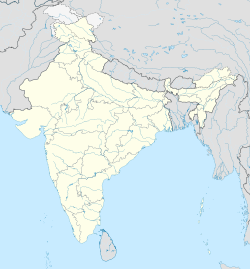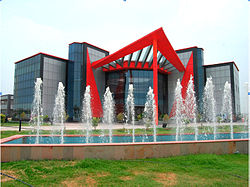Rohtak
| Rohtak रोहतक |
||
|---|---|---|
|
|
||
| State : |
|
|
| State : | Haryana | |
| District : | Rohtak | |
| Location : | 28 ° 54 ' N , 76 ° 35' E | |
| Height : | 224 m | |
| Residents : | 374,292 (2011) | |
| Website : | Rohtak | |
| Rohtak - new company building | ||
Rohtak ( Hindi रोहतक ) is the third largest city ( Municipal Corporation ) in the Indian state of Haryana with approx. 374,000 inhabitants after Faridabad and Gurgaon . It is the capital of the district of the same name .
location
Rohtak is located about 80 km (driving distance) northwest of Delhi at an altitude of 224 m ; Chandigarh , the common capital of Punjab and Haryana, is approximately 150 miles to the north. Rohtak has a train station with connections to many cities in northern India. The climate is hot and dry with the exception of the monsoon months from July to September.
population
Official population statistics have only been kept and published since 1991. The strong increase in the urban population is mainly due to the immigration of families from the surrounding area.
| year | 1991 | 2001 | 2011 |
| Residents | 216.096 | 294,577 | 374.292 |
About 97% of the population are Hindus , just under 1% each are Muslim , Jains and Sikhs ; Christians and Buddhists form splinter groups. Mostly Hindi is spoken . As is usual in northern India, the male population is more than 10% higher than the female; the literacy rate is 85.7%, making it one of the highest in India. They speak Hindi and Haryanvi .
economy
The district of Rohtak is traditionally agricultural, but in the 19th century many craftsmen, small traders and service providers settled in the town of Rohtak. In the 20th century the first smaller industrial, educational and health facilities emerged, which became more numerous as the city's population grew. The Haryana State Industrial and Infrastructure Development Corporation (HSIIDC ) set up an industrial park ( Industrial Model Township (IMT) ) in the 1990s, probably because of its relative proximity to the federal capital New Delhi , in which various companies have settled. The city is the seat of a university. Tourism is of no importance.
history
In the vicinity of Rohtak there are two early excavation sites of minor importance; In the Mahabharata the place name Rohitika appears, which is identified by some with today's Rohtak. In the Middle Ages there was a fortress, which fell in 1410 after a six-month siege and was then destroyed. Under the Mughal rule , the region belonged to the administrative district of Delhi. Later the Rajputs , Sikhs , Jats and Marathas fought over spheres of influence. In 1803, the region officially came under British rule , but the British initially paid little attention to the areas west of the Yamuna River . In 1824 the Rohtak District ( tehsil ) was established, which later became part of the Punjab and in 1966 the newly created state of Haryana.
In February 2016, insurgent Jats wreaked havoc on the business premises of non-Jats, so that some observers spoke of racist attacks.
Attractions
The largely modern city has no historically or culturally significant sights; only Tilyar Lake with the nearby Rohtak Zoo plays a role in the leisure activities of the city's residents.
Daughters and sons of the city
- Sakshi Malik (* 1992), wrestler
- Amit Panghal (* 1995), boxer
Web links
- Rohtak, Municipal Corporation Rohtak - Photos, Maps + Info (English)
- District Rohtak, history etc. - maps + information (English)


